Politics & Security
[Bookmark] EXCLUSIVE: After Stepping Down, Shinzo Abe Looks Back on Legacy
Published
4 years agoon
By
Rui Abiru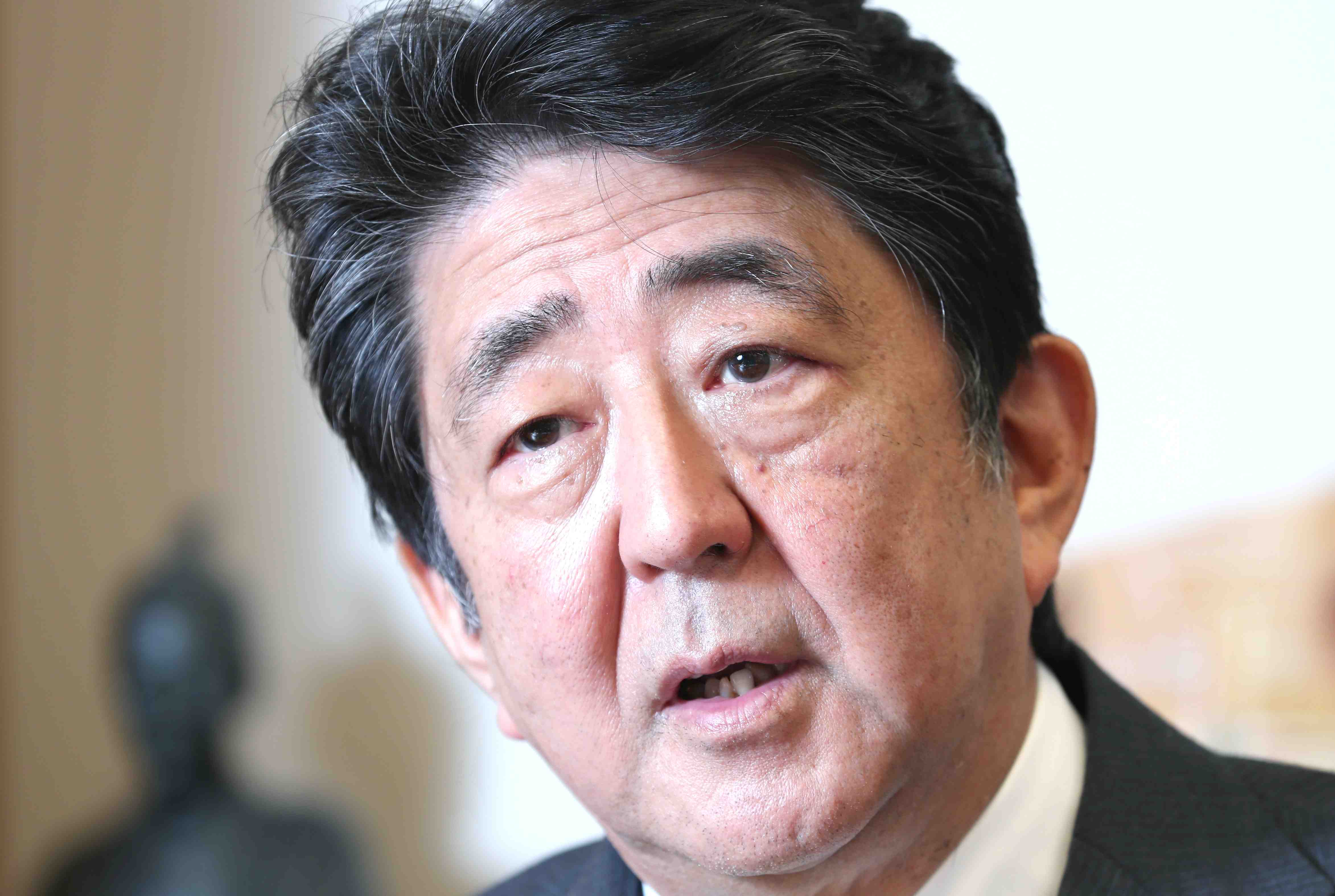
Bookmark is a JAPAN Forward feature that gives you long reads for the weekend. Each edition introduces one overarching thought that branches off to a wide variety of themes. Our hope is for readers to find new depths and perspectives to explore and enjoy.
(Conclusion)
Former Prime Minister Shinzo Abe’s record-breaking 2,822 days in office during his second stint made him Japan’s longest-serving prime minister in history. He oversaw the arrival of the new Reiwa Era and profound changes in the domestic discourse in Japan, from Abenomics to the arrival of the novel coronavirus.
On October 16, one month after he stepped down due to illness, the former prime minister sat down for an exclusive interview with three reporters of The Sankei Shimbun and JAPAN Forward.
In this Part 2 of the interview, we asked Mr. Abe: How does he view his record? What does he think about Japanese politics post-Abe? And what will he do now that he has stepped down from the job of prime minister?
Excerpts of the interview follow.
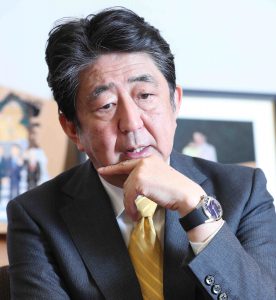
Former Prime Minister Shinzo Abe in an exclusive interview with The Sankei Shimbun and JAPAN Forward on October 16, 2020
Upon the arrival of the novel coronavirus, from the latter part of January until you resigned, you had your hands full dealing with the pandemic. What guided your actions?
Our main concern was to thoroughly prevent infections among individuals with underlying [health] conditions and the elderly, so as to limit the number of deaths to the greatest degree possible.
We also made great efforts to support the development of drugs and share knowhow. As a result, compared to other countries worldwide, in Japan we were relatively successful in holding down both the total number of deaths and the mortality rate relative to the total population.
Extraordinary measures were taken one after the next as the pandemic engulfed Japan and the world. What were you thinking at that time?
Evacuating Japanese residents from the Chinese city of Wuhan (where COVID-19 originated) presented major difficulties. However, with the cooperation of the Chinese government, Japan became the first member of international society to be able to evacuate its nationals.
The case of the cruise ship Diamond Princess, which saw mass infections onboard, presented peculiar difficulties since there were no clear rules on where responsibility lay and so on. This was the first example worldwide on the scale of the 3,700 passengers and crew on the ship. Although initially we received criticism from international society, later other countries ended up responding in the same way.
I must say that medical professionals have done a superb job in all aspects of the response to COVID-19.
Issuing the Declaration of a State of Emergency was certainly a major decision. What were your thoughts about it?
The government of Japan has been proceeding very cautiously in terms of limiting rights of the individual, including in the application of the revised Anti-Influenza Special Measures Act to respond to the new coronavirus. Within that context, we have had to provide knowledge on how to guard against infection.
It has been suggested that this caution is due to the absence of a clause on emergency situations in the Constitution. Is that true?
I believe that is because the Japanese people hadn’t previously faced such a situation.
The total closure of the schools caused considerable confusion. Was it necessary?
We concluded that, if by some chance the virus should spread and serious cases of infection arise among children, the Japanese public might receive a severe psychological shock. Then, too, if children were infected, they might pass the virus on to their parents and grandparents.
Although at that time many countries had not opted for total closure of schools, later such measures were adopted worldwide. That was the first step in promoting a change in behavior in the face of the “new normal” that the virus has created.
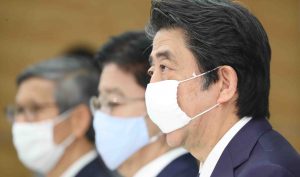
Prime Minister Shinzo Abe wears "the mask" distributed to every household in Japan when mask supplies were short in the early months of the pandemic. His cabinet members wear other masks.
Your distribution of cloth masks to every household in Japan drew criticism. Did the initiative accomplish what you hoped?
The record is clear. It was only after we started distributing those cloth masks that dealers who had inventories of masks but were holding onto them finally began releasing them all at once. The supply rose while prices dropped.
That leads us into the topic of Abenomics. There were four million jobs created. Did it lead to a dramatic economic turnaround?
The second Abe administration was the first administration to propose a package of real macroeconomic policies. Before becoming prime minister, I consulted with Koichi Hamada, professor emeritus in economics at Yale University in the United States; former Ministry of Finance official Yoichi Takahashi, who is now a professor at Kaetsu University; Kikuo Iwata, former deputy governor of the Bank of Japan (BOJ); and Kozo Yamamoto, former state minister in charge of regional revitalization. Their insights made me realize that Japan’s macroeconomic policies up to that point had been in error.
Excessive appreciation in the value of the yen had forced Japanese manufacturing to steadily relocate overseas, and continuing deflation had resulted in various ill effects, including “chain-reaction bankruptcies” throughout Japan. I concluded that we would not be able to break this deadlock unless we first drastically changed our monetary policy.
After that I was elected Liberal Democratic Party (LDP) president, and made a bold call for the BOJ to engage in unlimited monetary easing with an eye to achieving price stabilization targets. As a result, even before I became prime minister again, the money markets reacted, which reinforced my belief that I was on the right track.
Although we were roundly criticized at home, many eminent foreign economists, including Columbia University Professor Joseph Stiglitz who won the Nobel Prize for Economics, evaluated our policies very highly. That led us to launch our three-pronged” approach.
It is a universal truism that, when it comes to politics, the most important thing is job creation. And after Abenomics started producing results, that led to the creation of roughly four million new jobs. Employment rates for both high school and university graduates rose to previously unknown levels. We were thus able to prove that, in politics, economic policy has an important role to play.
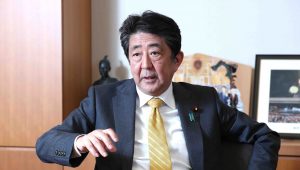
Former Prime Minister Shinzo Abe reflects on domestic achievements in October 16 interview.
The consumption tax was postponed two times and implemented two times. What can you tell us about it?
The consumption tax provides a stable source of revenue, and is most important as a revenue source to cover our burgeoning social insurance payments.
It is true, however, that at the same time tax increases negatively impact our efforts to escape deflation. We postponed implementation of the tax twice so as to avoid that economic burden.
Nevertheless, the two tax increases did secure a stable source of revenue, and will have a major impact in terms of providing early childhood education and making day care free.
The new administration of Prime Minister Yoshihide Suga has a high approval rate among the public. What is your appraisal of the choice of successor?
Since we are in the middle of the COVID-19 pandemic, I believe the public was hoping for someone who would be steady at the helm. Suga provides a sense of stability and continuity and a record of accomplishment as chief Cabinet secretary. That is why he wins high marks.
At the same time, Suga is a self-made man who was born into a farm family in Akita Prefecture. He then went on from such humble beginnings to be elected to the city council in Yokohama and ultimately became prime minister. I think Suga’s life story has struck a chord in the hearts of the Japanese people.
What kind of person is Prime Minister Suga?
He is very much a results-oriented politician. It would probably be fair to say that he is the ultimate realist. He is also very much in tune with public opinion, as shown, for example, in his concern for high mobile phone charges on family budgets.
There are expectations that the Suga administration will take on battles with special interests. Do you think that will happen?
Prime Minister Suga has made clear that he will be maintaining the policies of my administration. The public wants to see him concentrate on two fronts: preventing thw spread of COVID-19 and the economy. We have to beat the coronavirus pandemic.
What do you think about the way that the government has caused a furor in how it handled nominations to the Science Council of Japan?
I believe that the government made the decision it did in businesslike fashion. The policy of the Suga Cabinet seems to be that, when it comes to administrative reform, there should be no sacred cows.
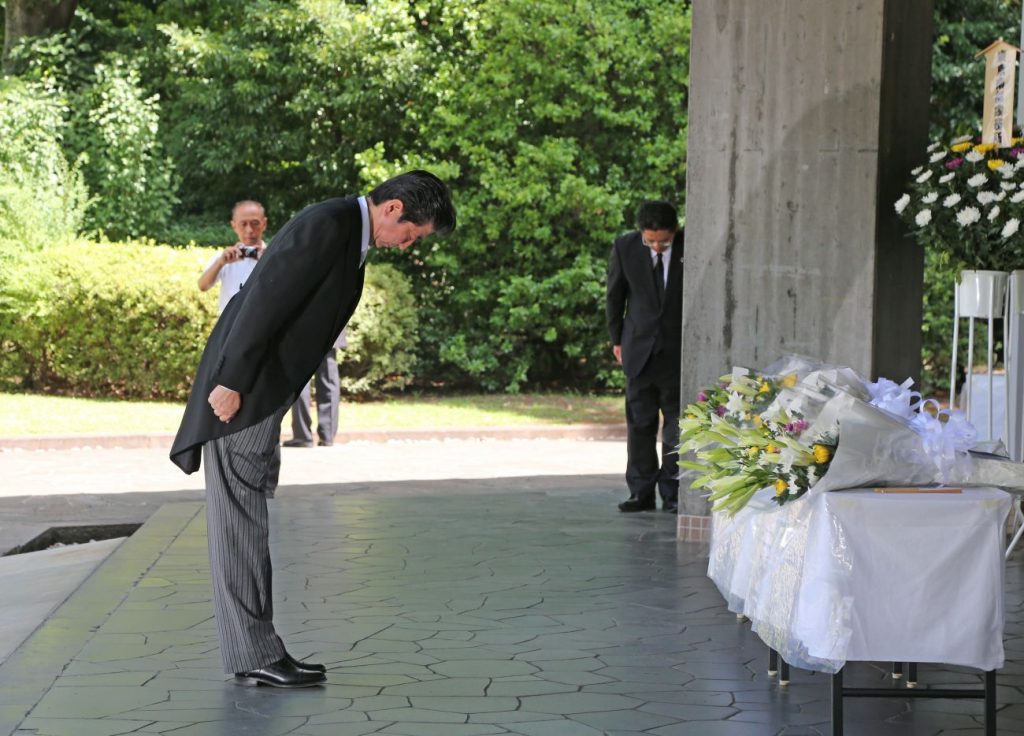
Instead of going to Yasukuni Shrine, then-Prime Minister Shinzo Abe offers prayers of tribute to the war dead in August 2018
You only visited Yasukuni Jinja once while prime minister. Why was that?
Most people have already forgotten about that visit (laughter). To my mind, if it was a question of having to put off a visit if I wanted to have a summit meeting [with the Chinese]. Then, I was willing to forego that summit meeting.
Wasn’t there also criticism from the United States?
I thought that I absolutely must visit the shrine once while in office. However, after I did so, I thought about what behavior would best be in the national interest.
Prime Minister Suga’s term as LDP president expires in September of next year, when your original term was due to expire. Will there be another prime minister?.
This is just my own opinion, but since PM Suga was just chosen this year, I wonder if there will be any good reason to replace him.
It has been said that there are no “post-Suga” candidates waiting backstage. Is that true?
No, such people will start emerging one after the next. Already several names are being floated. However, a general election is certain to be held before the expiration of the terms of Lower House members in October of next year. If you are talking about next year’s [LDP] presidential election, it would only be right for the party president who led it to victory to remain at the helm if the LDP wins.
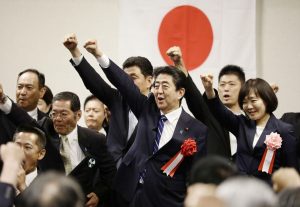
Then-Prime Minister Shinzo Abe and colleagues in the National Diet declare their Intent to Introduce legislation for Constitutional Revision, Autumn 2018
Constitutional revision was one of your early goals. What do you think of the new stance the LDP has adopted on constitutional revision?
I believe that through the respective efforts of former Chief Cabinet Secretary Hiroyuki Hosoda, who is chairman of the Commission on the Constitution of the House of Representatives, and former Vice Speaker of the House of Representatives, who is now head of the LDP’s Headquarters for the Promotion of Revision of the Constitution, the party has worked out its stance on constitutional revision.
The first thing that needs to be done is to get to work on revising the National Referendum Act, which was passed during my first term as prime minister (2007-2008). The opposition parties refused to even discuss the issue while I was prime minister. But now there is no reason for them to continue their childish objections.
How do things stand with the LDP today?
When I launched the second Abe administration, I made it clear that the LDP should be a conservative party. That probably hasn’t changed up to today. We respect our past history and are a political party that takes pride in that.
At the same time, the LDP is a party that respects freedom. Accordingly, naturally there should be various differences of opinion in our ranks. I want to see the party’s center of gravity be among our younger Diet members.
Do you think it would have been better if you hadn’t resigned as prime minister?
Whether or not I had a duty to continue as prime minister is a separate question. But we had reached the stage where a reshuffling of the Cabinet and shakeup of party posts was called for. Since it would not have been right if my physical condition had taken a turn for the worse after making those personnel changes, there could be no other timing [for the resignation announcement].
What will you be doing in the future?
I will still be a Diet member. But since I will enjoy more freedom of action, I can get out to meet and talk with all kinds of people. For one thing, since I haven’t been able to interact much with residents of my home constituency in Yamaguchi Prefecture, I would like to sound out their thinking.
【Explanation of Terms】
Total closure of the schools
In order to prevent an explosive spread of COVID-19, on February 27, 2020, Prime Minister Abe announced a request that all schools through the high school level temporarily shut down until the end of the spring vacation. The national government followed up on this announcement with emergency economic measures, including the institution of a new system for providing subsidies to guardians who would lose income because they had to stay home from work to take care of their children.
Abenomics
This term refers to the “three arrows” that formed the pillars of former Prime Minister Abe’s economic policies for escaping deflation:
(1) A bold economic policy calling for quantitative and qualitative monetary relaxation until the goal of a 2% rise in prices is achieved.
(2) Swift fiscal stimulus through adoption of a large-scale government budget.
(3) Growth policies meant to stimulate private investment in growth industries and job creation.
During the seven years and nine months Abe was in office, the Nikkei Stock Average rose from around ¥10,000 JPY to ¥23,000 JPY.
Election for LDP President
On August 28, Abe announced that he was stepping down as prime minister for reasons of health. In the election for LDP president that followed, Chief Cabinet Secretary Suga defeated two other candidates, Fumio Kishida and Shigeru Ishiba, by a large margin. On September 16, Mr. Suga was chosen by the Diet to become Japan’s 99th prime minister. Actually, Mr. Suga was chosen to serve out the remainder of Abe’s term as LDP president, which expires in September 2021. So, there is slated to be another LDP presidential election next year.
(Find access to the interview in Japanese here.)
Interviewed by: Rui Abiru, Mayumi Ogawa, Koji Sugimoto

You may like
-


Birth of an Asian NATO: A New Strategic Alliance Emerges Amid Regional Tensions
-


SusHi Tech Tokyo 2024 Press Preview Reveals Exciting Sustainable Technological Innovations
-


EDITORIAL | Why Spare Kishida from LDP Party Funds Mess Fallout?
-


EDITORIAL | Post-Earthquake Aid to Taiwan Must Meet Local Needs
-


Taiwan Relations Act at 45: Where's Japan's Version?
-


Trump 2.0: What Would It Mean for Japan

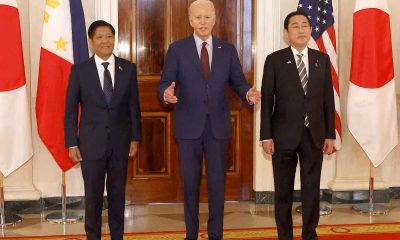

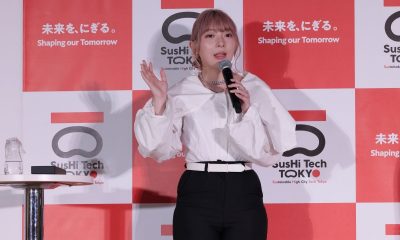

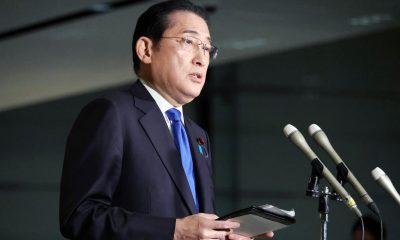

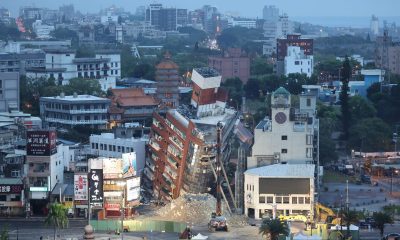

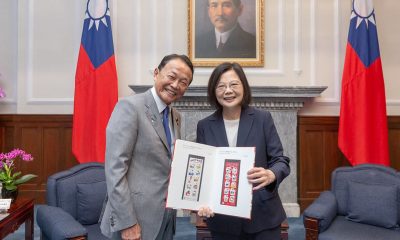

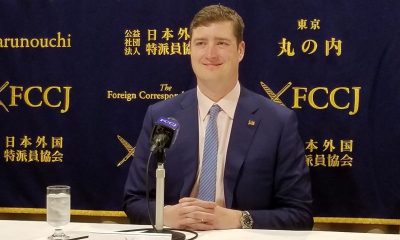


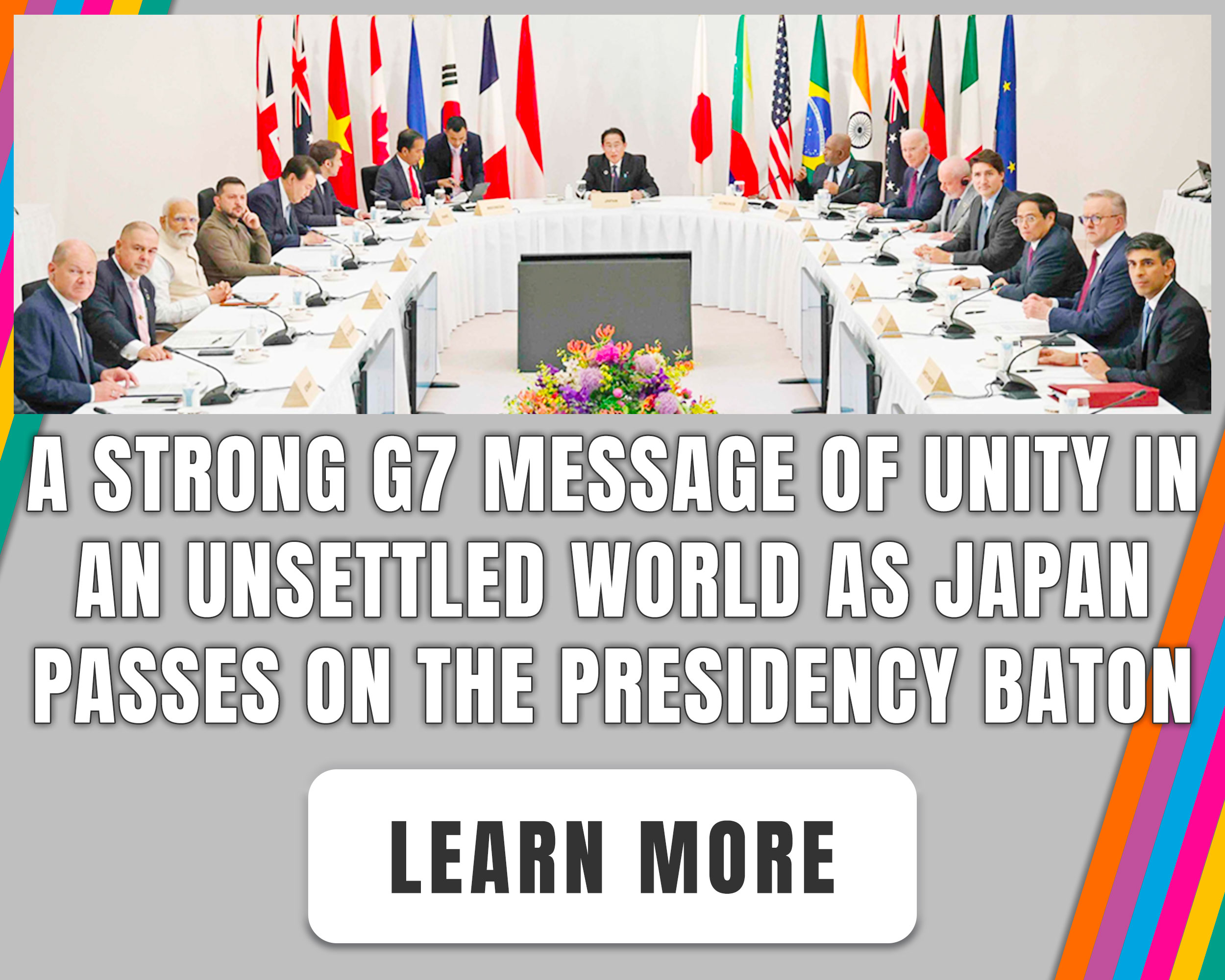
You must be logged in to post a comment Login